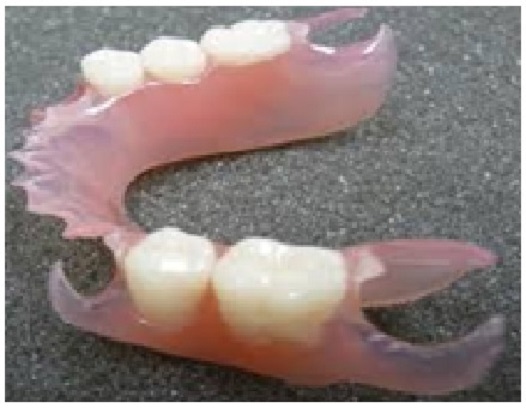
A denture is a removable replacement for missing teeth and surrounding tissues. Two types of dentures are available — complete and partial dentures. Complete dentures are used when all the teeth are missing, while partial dentures are used when some natural teeth remain.
Complete Dentures
Complete dentures can be either “conventional” or “immediate.” Made after the teeth have been removed and the gum tissue has begun to heal, a conventional denture is ready for placement in the mouth about 8 to 12 weeks after the teeth have been removed.
Unlike conventional dentures, immediate dentures are made in advance and can be positioned as soon as the teeth are removed. As a result, the wearer does not have to be without teeth during the healing period. However, bones and gums shrink over time, especially during the healing period following tooth removal. Therefore a disadvantage of immediate dentures compared with conventional dentures is that they require more adjustments to fit properly during the healing process and generally should only be considered a temporary solution until conventional dentures can be made.
Partial Denture
A removable partial denture or bridge usually consists of replacement teeth attached to a pink or gum-colored plastic base, which is connected by metal framework that holds the denture in place in the mouth. Partial dentures are used when one or more natural teeth remain in the upper or lower jaw. Not only does a partial denture fill in the spaces created by missing teeth, it prevents other teeth from changing position.
How do I clean my denture
Clean your dentures every day. Cleaning dentures daily with a denture brush and soaking them in a cleanser solution will help keep your dentures looking white and bright, while preventing plaque buildup and denture odor.
Rinse and brush your dentures in clean, warm water with a denture brush.
When cleaning dentures, don’t brush too hard; you don’t want to damage any plastic or metal parts of the dentures. If needed, moisten the denture brush to avoid damages or scratches to the denture surface.
Brush your gums, tongue, and natural teeth with a fluoride toothpaste, such as Crest®, before reinserting your dentures. This will help remove plaque from your teeth, stimulate circulation in your mouth, and help maintain good oral health.
After brushing, rinse with a mouthwash, to give your mouth a refreshed feeling.
Never try to adjust your dentures yourself. This might cause harm to your mouth or damage to your dentures.
Be sure to keep your dentures moist when you aren’t wearing them. This will keep them from drying out and losing their shape. Store your dentures in a denture cleanser soaking solution or in water. Never place your dentures in hot water. This can cause them to warp.
If your denture has metal attachments, talk to us about how it should be cared for. Placing this particular denture in water can cause the metal pieces to tarnish.


